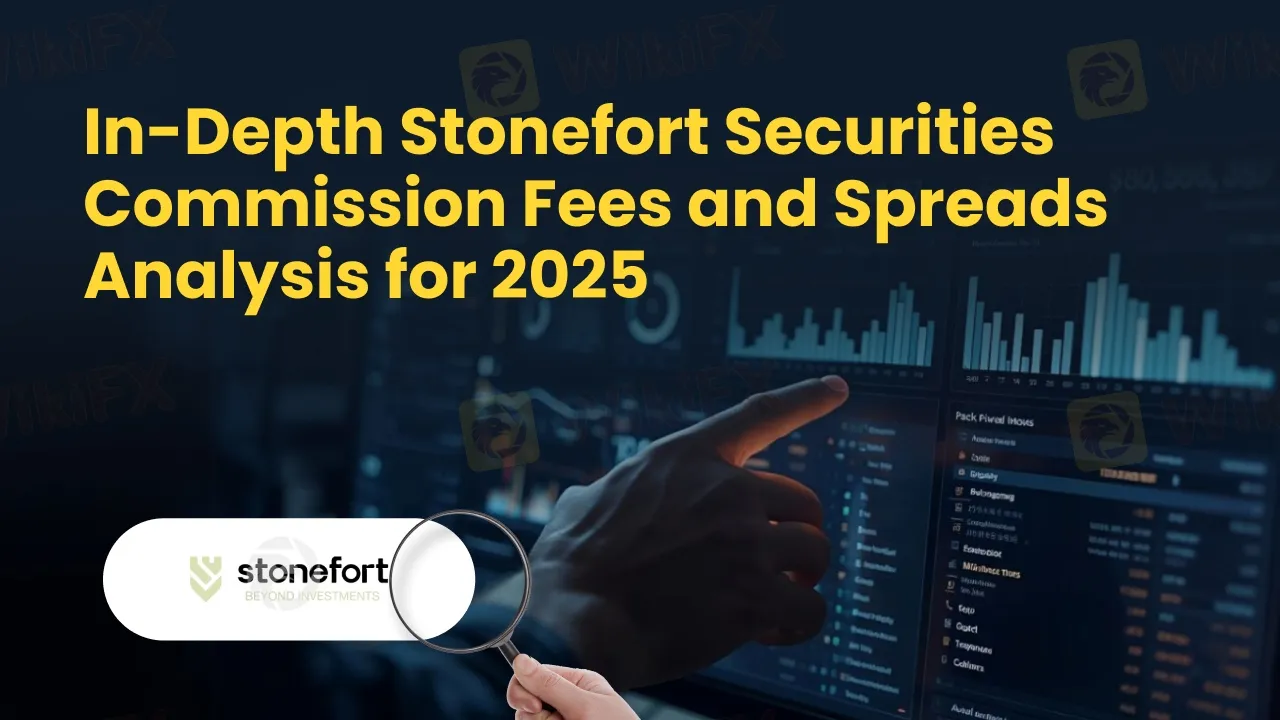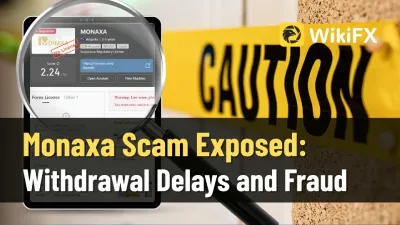Abstract:This comprehensive Stonefort Securities commission fees and spreads analysis aims to cut through the noise. We will dissect the broker's complete cost structure, from the spreads on its Elite account to its commission policies and the potential for hidden non-trading fees. Explore more.

For experienced traders, the long-term viability of a brokerage relationship hinges on a delicate balance of trust, reliability, and cost-effectiveness. While competitive pricing is a major draw, it means little if the underlying operational and regulatory framework is weak. This brings us to Stonefort Securities, a broker that presents a complex and often contradictory picture. On one hand, it advertises competitive trading conditions; on the other, it is flagged with significant regulatory warnings.
This comprehensive Stonefort Securities commission fees and spreads analysis aims to cut through the noise. We will dissect the broker's complete cost structure, from the spreads on its Elite account to its commission policies and the potential for hidden non-trading fees. However, a responsible analysis cannot ignore the fundamental questions regarding safety. Therefore, this review will first scrutinize the broker's regulatory standing and operational risks before delving into the specifics of its pricing, providing traders with the data needed to make an informed, risk-aware decision.
Stonefort Securities: A High-Level Broker Profile
Before examining the costs, it's essential to understand the entity in question. Based on data from global broker inquiry platform, WikiFX, Stonefort Securities presents the following profile:
• Company Name: Stonefort Securities Limited
• Registered Region: Saint Lucia
• Operating Period: 1-2 years
• Trading Platform: MetaTrader 5 (MT5)
• Regulatory Status: Holds a UAE SCA “Investment Advisory License” but is flagged for exceeding its business scope.
This initial overview immediately raises points of concern for a seasoned trader. The combination of a short operational history and an offshore registration in Saint Lucia—a jurisdiction known for its lighter regulatory touch—warrants caution. The most critical element, however, is the nature of its license, which demands a more detailed investigation.
Regulatory Scrutiny: A Critical Prerequisite to Cost Analysis
For any serious trader, analyzing a broker's fees is secondary to confirming its legitimacy and the safety of their funds. The most competitive spreads in the world are worthless if your capital is at risk due to regulatory loopholes or malpractice. In the case of Stonefort Securities, the regulatory data is alarming and forms a crucial context for its entire offering.
The Misleading UAE SCA License
At first glance, a license from the United Arab Emirates Securities and Commodities Authority (SCA) might seem credible. However, the details are what matter. Stonefort Securities LLC holds License No. 20200000226, which is explicitly defined as an Investment Advisory License. This is not a license for brokerage activities.
An advisory license typically permits a firm to offer financial advice, analysis, and recommendations. It does not authorize the firm to execute trades, hold client funds for forex and CFD trading, or act as a market maker. WikiFX issues a stark warning on this matter: “This broker exceeds the business scope regulated by the United Arab Emirates SCA... Non-Forex License. Please be aware of the risk!”
This is a critical red flag. It suggests that Stonefort Securities is leveraging an unrelated license to project an image of regulatory compliance while offering services—like forex trading—that fall outside its legal permissions in the UAE. For traders, this means that any funds deposited for trading purposes are likely not protected under the SCA's regulatory framework, leaving them with no recourse in the event of disputes, withdrawal failures, or insolvency.
Offshore Registration and Corporate Ambiguity
Compounding the licensing issue is the broker's primary registration in Saint Lucia. Offshore financial centers are frequently chosen by high-risk brokers due to their minimal capital requirements, lax oversight, and corporate structures that make it difficult for clients to pursue legal action. Should a trader face a significant issue with Stonefort Securities, seeking legal remedy against a Saint Lucia-registered entity would be an arduous and likely fruitless endeavor.
The corporate structure is further complicated by MT5 servers located in Mauritius and Singapore, adding layers of jurisdictional ambiguity. It is unclear which legal entity a client is contracting with when they open an account. This lack of transparency is a hallmark of high-risk operations, as it obfuscates accountability. Prudent traders can visit WikiFX to check the brokers detailed regulatory status and see the explicit warnings associated with its licensing and offshore structure.
A Deep Dive into the Stonefort Securities Spreads, Commissions, and Cost Structure
With the significant regulatory risks established, we can now proceed with a technical analysis of the broker's advertised costs. The information available primarily details the top-tier “Elite” account, revealing a structure that, on the surface, appears designed for high-volume traders.
Account Tiers and Pricing Models
Stonefort Securities offers three primary account types: Starter, Advanced, and Elite. However, transparency on costs is severely limited for the two lower-tier accounts.
• Starter Account: No specific data is provided on spreads, commissions, or minimum deposit.
• Advanced Account: Similarly, there is no public information regarding its cost structure.
• Elite Account: This is the only account for which detailed pricing is available.
This lack of information for the entry-level accounts is a significant drawback. It prevents prospective traders from accurately comparing Stonefort's full offering against other brokers and forces them to engage with the company directly to learn basic pricing details—a practice that is not typical of transparent, client-focused brokers.
Analysis of the 'Elite' Account Cost Structure
The Elite account is clearly positioned for well-capitalized traders, and its cost structure reflects a classic ECN/STP model combining raw spreads with a fixed commission.
• Minimum Deposit: $10,000
• Minimum Spread: From 0.1 pips
• Commission: $8
Let's break down these components:
1. The Spread: A minimum spread “from 0.1 pips” on major pairs like EUR/USD is competitive. The “from” indicates that this is the lowest possible spread available, likely during periods of high liquidity. Traders should expect the typical or average spread to be higher. This is a variable spread model, meaning the cost will widen or tighten depending on market volatility and liquidity. For a $10,000 account, access to near-zero raw spreads is a standard expectation.
2. The Commission: The $7 commission is a crucial part of the total cost. In the absence of clarification, the industry standard is to assume this is a $7 round-turn (RT) commission per standard lot (100,000 units of the base currency). This means you pay $3.50 when you open a trade and $3.50 when you close it.
To calculate the effective spread, you must add the commission cost. A $7 RT commission is equivalent to adding 0.7 pips to the raw spread. Therefore, if a trader achieves the minimum 0.1 pip spread on EUR/USD, their total cost for that trade would be:
0.1 pips (Raw Spread) + 0.7 pips (Commission Cost) = 0.8 pips (Effective Spread)
An effective spread of 0.8 pips on EUR/USD is competitive but not market-leading. Many top-tier, well-regulated brokers offer effective spreads in the 0.6-0.9 pip range for their premium accounts. Therefore, while the Elite account's pricing is reasonable, it does not offer a significant cost advantage that would justify overlooking the severe regulatory concerns.
Swap Fees and Overnight Financing
The provided data does not specify Stonefort Securities' swap policy. However, as a standard practice in CFD trading, traders must assume that holding positions open overnight will incur swap fees (or credits). These fees are interest payments based on the differential between the two currencies in a pair and can be a significant cost for swing and position traders.
Without a published table of swap rates, the only way for a trader to determine these costs is by:
1. Opening a demo account with the broker.
2. Checking the “Specification” or “Properties” for each instrument directly within the MT5 platform.
Traders should be particularly cautious of brokers that charge excessively high or non-transparent swap fees, as this can be a hidden way to increase trading costs.
Non-Trading Fees and Other Potential Costs
Beyond spreads and commissions, experienced traders know to look for indirect costs that can erode profits. The lack of transparency from Stonefort Securities in this area is another concern.
• Deposit and Withdrawal Fees: The WikiFX data shows “--” for both depositing and withdrawal methods, indicating a lack of public information. While some user reviews claim withdrawals are “hassle-free,” this does not confirm whether fees are applied. High-risk brokers often impose hefty withdrawal fees or complex procedures as a way to retain client funds.
• Inactivity Fees: It is common for brokers to charge a monthly inactivity fee if an account has no trading activity for a set period (e.g., 90 days). There is no information on whether Stonefort Securities has such a policy.
• Currency Conversion Fees: If a trader deposits funds in a currency different from their account's base currency (e.g., depositing EUR into a USD-denominated account), a conversion fee may be applied. The rate of this fee is another potential hidden cost.
Trading Platform and Execution Environment
A broker's technology stack is integral to the trading experience, affecting everything from order execution to analytical capabilities.
MetaTrader 5 (MT5) Full License
Stonefort Securities operates on the MetaTrader 5 (MT5) platform and holds a “Full License.” This is a positive attribute. MT5 is an industry-leading platform known for its advanced charting tools, support for more order types than its predecessor (MT4), and a robust environment for automated trading with Expert Advisors (EAs). A full license suggests the broker has invested in a proper technology setup rather than a cheaper, less reliable white-label solution.
Server Infrastructure and Execution Speed
The data reveals an average execution speed of 53.33 ms. This speed is respectable and falls within an acceptable range for most retail trading strategies. Speeds under 100ms are generally considered good.
However, the MT5 servers are located in Mauritius and Singapore. This could have latency implications for traders based in Europe or North America, as data must travel a greater physical distance. While 53.33 ms is the average, traders far from the server locations may experience slightly higher latency, which could be a factor for high-frequency or scalping strategies.
Conclusion: A High-Risk Proposition Where Costs are a Secondary Concern
After a thorough Stonefort Securities commission fees and spreads analysis, a clear verdict emerges. While the advertised cost structure for its $10,000 Elite account—spreads from 0.1 pips plus a $7 RT commission—is reasonably competitive, it is rendered almost irrelevant by the overwhelming operational and regulatory risks.
The core issues are non-negotiable for any prudent trader:
1. Inadequate Regulation: The broker operates with an “Investment Advisory License” from the UAE SCA, which does not authorize it to provide forex trading services. This means client funds are likely unprotected.
2. Offshore Anonymity: Its registration in Saint Lucia provides a weak legal and regulatory shield for clients, making dispute resolution nearly impossible.
3. Lack of Transparency: Critical cost information for entry-level accounts, along with details on non-trading fees like withdrawal charges, is completely absent.
The positive, unverified user reviews praising smooth withdrawals and helpful support stand in stark contrast to the verifiable, hard data pointing to a high-risk operation. For an experienced trader evaluating a broker for long-term partnership, unverified anecdotes cannot outweigh fundamental deficiencies in regulation and corporate governance.
Ultimately, the Stonefort Securities spreads, commissions, and cost structure may seem appealing at a glance, but the foundation upon which it is built is critically flawed. The risk of capital loss due to non-trading factors far exceeds any potential savings on transaction costs. Before making a final decision on any broker, cautious readers should always consult WikiFX to get structured, up-to-date information, user feedback, and expert evaluations to protect their investment.
For more forex updates, news, tips and insights, follow these special chat groups (OIFSYYXKC3, 403M82PDMX or W2LRJZXB7G).










